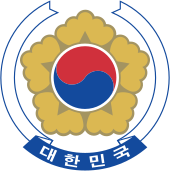Penal Code (South Korea)
This article needs additional citations for verification. (May 2010) |
| Penal Code | |
|---|---|
 | |
| National Assembly of South Korea | |
| Territorial extent | South Korea |
| Enacted | Sept 18, 1953 |
| Commenced | Oct 3, 1953 |
| Status: In force | |
| Penal Code | |
| Hangul | 형법 |
|---|---|
| Hanja | 刑法 |
| Revised Romanization | Hyeongbeop |
| McCune–Reischauer | Hyŏngbŏp |
Penal Code (형법[1]) is the criminal law code currently used in South Korea. The first modern form of criminal code in Korea was introduced during Korea under Japanese rule. From 1912 to 1953, the Japanese Criminal code was used for the duration of around 40 years. In Sept 18, 1953, South Korea enacted its own criminal code.
Origin[]
The criminal related laws for Joseon generally followed China's forms of law; however it had its own uniqueness based on Joseon traditions and Neo-Confucianist ideologies. In 1912, the Governor-General of Korea declared the Chosen Criminal Order (조선형사령) and in April 4 of the same year, the Penal Code of Japan and Criminal justice system of Japan was in force in Korea. After liberation, the Chosen Criminal Order was still in place until Oct 2, 1953 by the USAMGIK Ordinance 21 and the Constitution of South Korea.
The law was enacted 50 days after the Korean War in September 18, 1953. 15 days later in Oct.3, the law was officially in force.
The Penal Code enacted in 1953 was mostly a translation of the former Japanese criminal code. However, as time passed, South Korea's Penal Code became more subjective than the Japanese criminal code. The South Korean Penal Code has stronger penalties in comparison to the Japanese criminal code, excluding robbery and other property related crimes. Punishments are stricter on laws regarding government rights and almost all laws that include punishments for preparing a criminal act also have a punishment for plotting one.
Abstract[]
Types of Punishment[]
Types of punishment include under the criminal code Capital punishment, Imprisonment with hard labor, Imprisonment, disqualification, Loss of rights due to conviction for criminal offense, Fine (penalty), minor fine, and Confiscation of property.
Imprisonment with hard labor and imprisonment is classified as an Indefinite imprisonment and Definite imprisonment. Definite imprisonments are longer than a period of 1 month and less than 30 years. However, in the case of an additional punishment, definite sentences can last up to 50 years.
Parts[]
Penal code of Korea is composed with two parts, a general regulation and each crime. In general regulations, there are four parts, 1. Application scope of Criminal law, 2. Crime, 3. Punishment, 4. Duration. In the part of each crime, it defines 42 crimes.
Crimes in Penal Code of Korea[]
- conspiracy of a rebellion
- conspiracy of the foreign troubles
- crime about the national flag
- crime about diplomatic relations
- infringement of public peace
- crime about explosive materials
- crime about a duty of Public Officials
- interference with a government official in the exercise on his duty
- a fugitive and a concealment of the criminal
- the perjury and the destruction of evidence
- the calumny (the false charge)
- spoil a dead body and a burial ground
- the incendiarism and an accidental fire
- crime about irrigation and water control
- infringement of the traffic
- crime about drinking water (poisoning into water)
- crime about illegal drugs
- crime about currency (a counterfeit)
- crime about a check, a bond, a stock (forgery)
- forgery of a document (public and private)
- the forgery of a seal
- crime about adultery
- Penal code of Korea still have the provisions of adultery.
- It is now controversial whether it is not against the constitutional law
- crime about a lottery ticket
- murder
- Penal code of Korea, There is an increasing punishment of murder of parents.
- It may be effected by Confucianism.
- the injury and the violence
- an accidental homicide and injury
- the abortion
- abandon and maltreatment to person
- illegal imprisonment and confinement
- the duress
- the abduction (kidnapping)
- the rape and committing obscene acts
- the defamation of character (slander)
- the spread of falsehood
- the leakage of classified information
- unlawful entry
- the interruption of other persons' legal rights
- the theft and the burglary
- the fraud and the menace
- the breach of trust and the embezzlement
- crime of dealing in stolen goods
- destruction of other's property
External links[]
- "Criminal Code (wholly amended 1 January 1998) [Republic of Korea], 3 October 1953". UNHCR RefWorld. United Nations High Commissioner for Refugees. Retrieved February 14, 2013.
- "Criminal Act (Act No. 239 of September 18, 1953, as amended up to Act No. 11731 of April 5, 2013)". WIPO Lex. World Intellectual Property Organization. Retrieved May 1, 2015.
See also[]
- Politics of South Korea
- Crime in South Korea
- Criminal codes